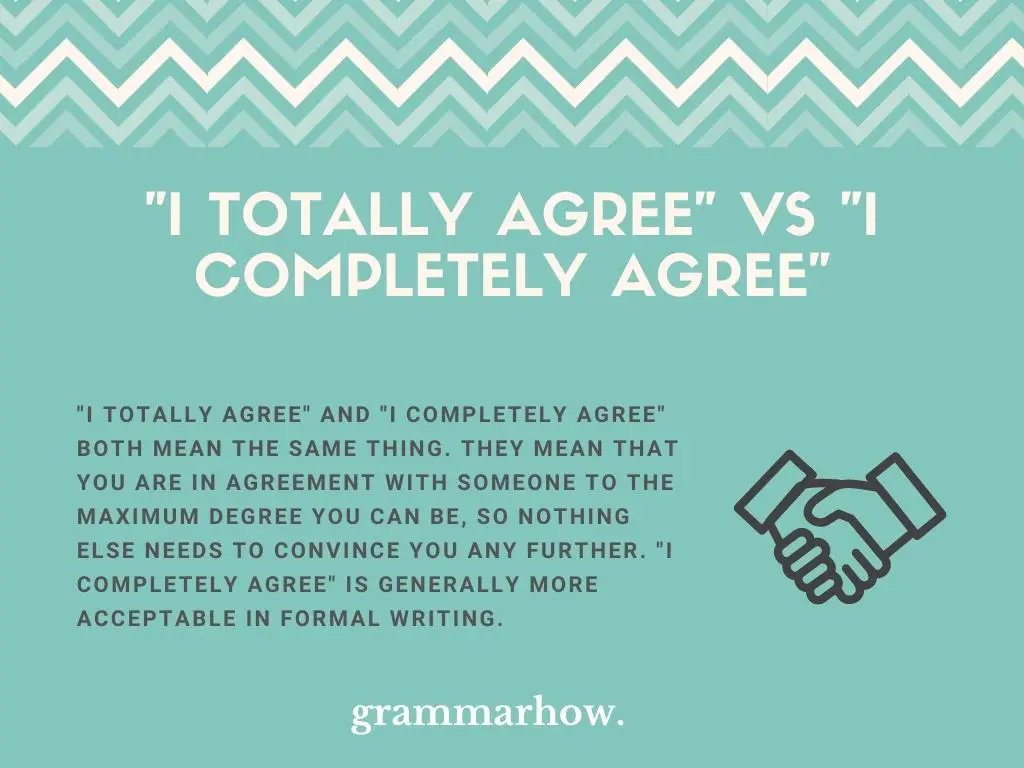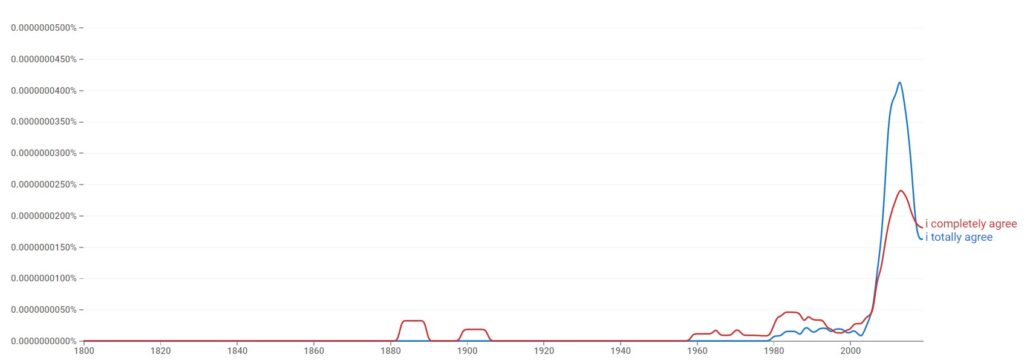The phrases “I totally agree” and “I completely agree” are very similar. However, is one more correct than the other, and how do we know which is best to use? We’ll explore the answer to that in this article.
What Is The Difference Between “I Totally Agree” And “I Completely Agree”?
“I totally agree” and “I completely agree” both mean the same thing. They mean that you are in agreement with someone to the maximum degree you can be, so nothing else needs to convince you any further. “I completely agree” is generally more acceptable in formal writing.

Can “I Totally Agree” And “I Completely Agree” Be Used Interchangeably?
We can use both phrases interchangeably. It’s easy since “totally” and “completely” are both synonymous with each other and mean “to the maximum extent.”
If we look at this graph, we can look at the two used in literature and how common they are. When used interchangeably, they’ve always been even. There was a brief time in 2012 when “totally” became the popular choice, but “completely” is now the slightly more popular of the two.

The brief explosion of “totally” in 2012 might be related to the word being used more frequently in reality TV shows. For this reason, it might also be part of why “I totally agree” is the less formal of the two.
People often see “totally” as a filler word that’s lazy and requires no thought. For that reason, many people avoid using it and stick with “I completely agree” when they want to show the maximum degree with something.
Is It Correct To Say, “I Totally Agree With You”?
Typically, when we’re saying we “agree” with something, we are talking about agreeing with a point that somebody has made.
The phrase “I totally agree with you” is correct, though it’s still an informal saying. “With you” are considered unnecessary words and often get omitted, which is why “I totally agree” is more commonly used.
Both phrases are correct and mean the same thing. You can look at them as follows:
- I totally agree (with you).
When kept in parenthesis, it shows you what we mean slightly better. The “with you” portion of the phrase is optional but always implied even if it isn’t used.
Example Sentences
Let’s take a look through some examples of when “I totally agree” is the most common choice.
- I totally agree with everything you’re saying!
- I totally agree with you and can’t believe I didn’t think of that!
- I totally agree that you shouldn’t be held back.
- I totally agree and believe you’re ready to dive in!
- I totally agree and don’t think you need to say more!
As you can see, “I totally agree” is the common phrase, but what comes after it can vary based on the rest of the sentence.
Is It Correct To Say, “I Completely Agree With You”?
We can also apply everything we’ve previously mentioned to the phrase “I completely agree with you.”
“I completely agree with you” is correct to say and is considered the long-form phrase of “I completely agree.” Again, “with you” is often left out of the phrase, but the implication of using it is still the same.
- I completely agree (with you).
Here we can see that “with you” is again an option for you to choose. However, the meaning is always implied that we’re talking about agreeing “with you” even if we don’t say it.
Example Sentences
- I completely agree with you.
- I completely agree with all that you’ve mentioned.
- I completely agree that things desperately need to change.
- I completely agree with the points raised but would like to add to them.
- I completely agree and think something needs to be done.
Alternatives To “I Totally/Completely Agree”
Finally, let’s look at some examples of what else we might be able to use.
- I entirely agree
“Entirely” is synonymous with words like “totally” and “completely,” so it works well as a replacement.
- I fully agree
Again, “fully” is another synonymous word that we can use in this sense.
- I agree wholeheartedly.
If we want to show that we’re passionate about the agreement we’re making, then “wholeheartedly” is a great word to use to show that.
